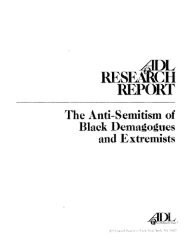You also want an ePaper? Increase the reach of your titles
YUMPU automatically turns print PDFs into web optimized ePapers that Google loves.
J?ocument Results<br />
o<br />
o<br />
Page 3 of8<br />
,: rearmament. Defense acquisitions made over the past several years have steadily broadened Iran's<br />
strategic reach over vital Persian Gulf shipping lanes, to the point that Tehran now possesses the ability<br />
to virtually control oil supplies from the region. (13) Iran has also increased its diplomatic activism In the<br />
region, redoubling its long-running efforts to erect an independent security framework as a<br />
counterweight to the expanding U.S. military footprint. (14)<br />
As part of this effort, in February 2004, Iran codified an unprecedented military and defense accord with<br />
Syria"-one formally enshrining an Iranian commitment to Syria's defense in the event of a U.S. ~r Israeli<br />
offensive. Iranian officials have subsequently made clear that these mutual defense guarantees also<br />
extend to Lebanon-and to the Islamic Republic's most potent regional proxy: Hizbullah. (15)<br />
Iran has also raised its military and diplomatic profile in the Caucasus. In April 2003, foreign minister<br />
Kharrazi embarked on a diplomatic tour of the region intended to marshal support for a common regional<br />
security framework for Georgia, Armenia, Azerbaijan, Russia, Iran, and Turkey as an alternative to<br />
cooperation with "external forces." (16) But lukewarm regional responses have prompted the Islamic<br />
Republic to nudge these·countries into alignment through less subtle means. In mid-October 2003, Iran<br />
commenced large-scale military maneuvers In its northwest region, near Azerbaijan. The exercises,<br />
reportedly the largest conducted by Iran in recent memory, massed troops on the Iranian-Azeri border in<br />
a Clear show of force aimed at dissuading the former Soviet republic from expanding cooperation with<br />
the United States. (17) A corresponding Iranian naval buildup Is now visible In the Caspian Sea in<br />
response to Kazakhstan and Azerbaijan's growing military relationships with Washlngton~<br />
U.S. advances in the region are regarded by Iran as potential threats, but paradoxically they have also<br />
presented Iran with opportunities that it has been quick to exploit.<br />
* The coalition campaign against ~addam Hussein's regime succeeded in eliminating the threat posed by<br />
Tehran's most Immediate adversary, thereby cementing Iran's dominant regional standing, Iran has<br />
exploited'the postwar political vacuum In Iraq to foment Instability through a variety of measures,<br />
ranging from political support of radical Shi'ite·elements to an increase in drug trafficking. (-18) This<br />
broad offensive has reportedly included the Infiltration of hundreds ,of Pasdaran operatives into Iraq<br />
where they"have engaged in active recruitment,·influence operations, and assassinatlons--at a cost to<br />
Iran of some $ 70 million per month., (19)<br />
* Hussein's overthrow has also effectively defanged a lingering threat to Tehran: the MUjahldeen-eKhalq<br />
Organization (MKO), a wing of the National Council of Resistance of Iran. Since the spring of 2003,<br />
coalition forces under a U.S.-imposed cease-fire have curtailed the anti-regime group's operations In<br />
Iraq. And a subsequent December decision· by Iraq's new governing council has labeled the MKO-<br />
preViously tolerated and even supported by the Baathlsts--as a terrorist organization. (20)<br />
* To Iran's east, meanwhile, the fall of the Taliban has removed an ideological competitor for Muslim<br />
hearts and minds while lingering factionalism and tribal rivalries have allowed Iran to perpetuate<br />
Afghanistan's instability.<br />
Iran Is clearly determined to remake its strategic environment in its favor. Iran J'las mobilized its<br />
technological resources to give it greater reach and has used political, economic, and military clout to<br />
encourage a tilt in its direction in its immediate neighborhood. Paradoxically, the United States, by<br />
breaking up the old order in states neighboring Iran, has given Tehran hitherto unimagined opportunities<br />
to influence the reg ion.<br />
FALSE STARTS<br />
Can International diplomacy deflect Iran's newe~t drive for regional hegemony? It hardly seems likely.<br />
From 1991 to 1997, the European Union (EU) engaged in a "critical dialogue" with the Islamic Republic,<br />
attempting to moderate Iran's radical policies through trade. But by 1997, critical dialogue had actually<br />
achieved exactly the opposite result, infusing Iran with much needed currency while failing to alter<br />
Tehran's support for terrorism, its pursUit of WMD, and its violations of human rights. Diplomacy has had<br />
a limited effect because the EU countries have allowed their economic interests to· undercut their<br />
diplomatic efforts. For example, in late 2002, In the midst of revelations regarding Iran's advanced<br />
nuclear development, the EU signaled its intention to commence new negotiations with the Islamic<br />
Republic on a sweeping trade and cooperation pact. (21)<br />
The United States has also wavered in its application of diplomatic pressure. The May 1997 election of<br />
https://w3.1exis.comllawenfsolutions_securedls~archforms/doBrowse.asp?SearchInfoID=... 11118/2004




